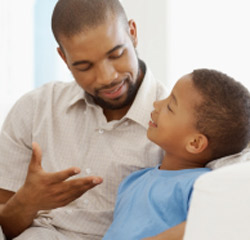
The human child remains with a parent until the child is capable of making his own decisions about his health, safety, and well-being. The parent holds authority over this child until that time — usually through the teen years.
That’s the reason for parent authority. It is not to control the child to be who the parent wants or to demand obedience to make life easier for the parent. This leads to power struggles and rebellion or looking to others for authority and approval.
Your job as parent is to insure that your child does what she shouldn’t be expected to do on her own – simply because she’s too young.
Rick Trinkner of the University of New Hampshire has researched the types of families who raise self-confident, self-controlled, respectful children. Trinkner says,
When children consider their parents to be legitimate authority figures, they trust the parent and feel they have an obligation to do what their parents tell them to do. This is an important attribute for any authority figure to possess, as the parent does not have to











